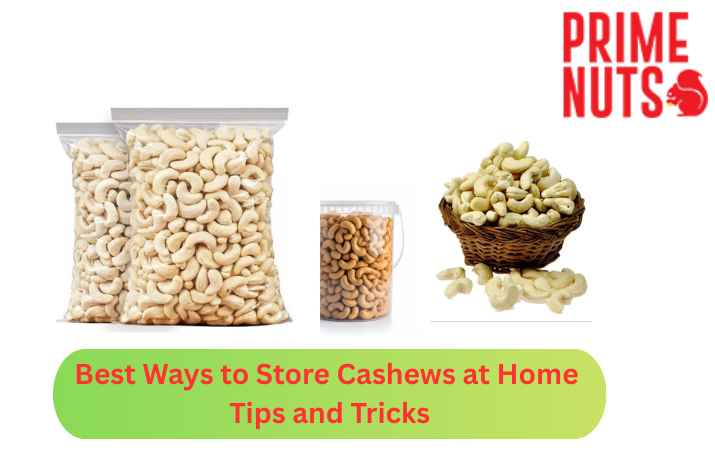
Best Ways to Store Cashews at Home: Tips and Tricks

Introduction
Cashews are loved all over the world for their creamy taste, high nutritional value, and the many ways they can be used in cooking. You can eat them by themselves or put them on top of curries or sweets. They make almost anything taste and feel better. But cashews, like most nuts, have natural oils that can go bad if they are not kept properly. To get the most out of their taste and health benefits, keep them fresh.
This article will talk about easy and useful ways to store cashews at home so that they don’t go bad and each bite stays as tasty as the last.
Why Proper Storage of Cashews Is Important?
Cashews, like other nuts, are high in healthy fats, particularly unsaturated fatty acids. While these fats are beneficial for health, they are delicate and can spoil when exposed to heat, light, or moisture. Improper storage may lead to cashews losing their crunch, flavour, and even developing a stale or bitter taste.
Moreover, cashews can easily absorb Odors from nearby foods, which alters their natural flavour. Storing them properly not only maintains freshness but also helps prevent waste.
General Guidelines for Storing Cashews
Before looking into specific storage methods, here are some universal guidelines you should follow:
- Keep them away from heat and sunlight – Store cashews in a cool, dark place to prevent oxidation of oils.
- Avoid moisture – Even a small amount of water or humidity can lead to Mold growth.
- Use airtight containers – Exposure to air accelerates spoilage, so airtight jars or boxes are essential.
- Buy in small quantities – If you don’t consume cashews often, avoid purchasing them in bulk.
Room Temperature Storage
If you consume cashews regularly, keeping them at room temperature for short-term use is convenient.
- Use airtight glass or plastic containers instead of keeping them in plastic packets.
- Store the container in a cool, dry cupboard, away from direct sunlight or the stove.
- Cashews stored at room temperature can last up to one month without losing Flavours, provided the humidity is low.
This method is best suited for households where cashews are eaten daily in snacks, curries, or desserts.
Refrigeration: Extending Shelf Life
For longer storage, refrigeration is one of the best ways to preserve cashews.
- Place cashews in a sealed glass jar or food-grade plastic container.
- Keep them away from strong-smelling foods like onions or garlic to prevent Odor absorption.
- In the refrigerator, cashews can stay fresh for up to 6 months.
This method is highly recommended in warm or humid climates where room temperature storage is risky.
Freezing Cashews for Long-Term Storage
If you’ve bought cashews in bulk or want to store them for several months, freezing is the best option.
- Divide cashews into small portions and pack them in resealable freezer bags.
- Remove as much air as possible before sealing to avoid freezer burn.
- Store them flat in the freezer for easy stacking.
- Frozen cashews can last up to one year without losing quality.
Before using, take out only the required portion and allow it to thaw at room temperature. Freezing does not affect their taste or nutritional value.
Storing Roasted vs. Raw Cashews
- Raw cashews are more delicate as they are less processed and have higher moisture content. They spoil faster if not stored properly, so refrigeration or freezing is preferable.
- Roasted cashews are slightly more stable due to reduced moisture but still need airtight storage to maintain crispness.
If you season or flavour cashews at home (with salt, spices, or honey), ensure they are completely cool and dry before storing to prevent clumping or Mold.
Tips to Prevent Cashew Spoilage
- Check for freshness regularly – Spoiled cashews develop a sharp, bitter taste and an unpleasant Odor.
- Avoid plastic bags – Thin bags are not airtight and may trap moisture, leading to faster spoilage.
- Use vacuum-sealed containers – If possible, vacuum sealing helps extend shelf life significantly.
- Store in small batches – Dividing large quantities into smaller containers ensures that exposure to air is minimized.
How to Identify Spoiled Cashews?
Even with proper care, cashews won’t last forever. Here are some signs they may have gone bad:
- A sour or rancid smell instead of their natural nutty aroma.
- A change in taste from creamy to bitter.
- Visible Mold or unusual discoloration.
If you notice any of these, it’s best to discard them to avoid stomach upset or food poisoning.
Conclusion
Cashews are a healthy nut. Make sure you store them correctly so they stay fresh and tasty. No matter when you want to use the peanuts, there is a good way to keep them. For a short time, boxes that don’t let air in are fine to use at room temperature. In order to keep food fresh for longer, it’s best to freeze or chill it.
You can always enjoy crunchy, tasty cashews as long as you keep them away from heat and in containers with lids. Also, make sure you check them often to make sure they don’t go bad. These nuts are good for you and can save you money if you store them the right way.



